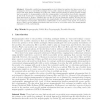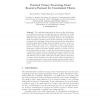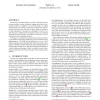686 search results - page 13 / 138 » Secure Two-Party Computation Is Practical |
113
Voted
AINA
2005
IEEE
15 years 8 months ago
2005
IEEE
Mobile code computation has lead to a new paradigm of distributed computation. A mobile process can move from site to site and interact with the resources as a local process. To p...
125
Voted
EUROCRYPT
2004
Springer
15 years 8 months ago
2004
Springer
Informally, a public-key steganography protocol allows two parties, who have never met or exchanged a secret, to send hidden messages over a public channel so that an adversary can...
153
Voted
PET
2012
Springer
13 years 5 months ago
2012
Springer
The continuing advancements in microprocessor technologies are putting more and more computing power into small devices. Today smartphones are especially popular. Nevertheless, for...
132
Voted
IEEESP
2010
15 years 1 months ago
2010
The need for controlled sharing of sensitive information occurs in many realistic everyday scenarios, ranging from critical (e.g., national security) to mundane (e.g., social netw...
126
click to vote
INFOCOM
2008
IEEE
15 years 9 months ago
2008
IEEE
—Trusted Collaborative Computing (TCC) is a new research and application paradigm. Two important challenges in such a context are represented by secure information transmission a...



